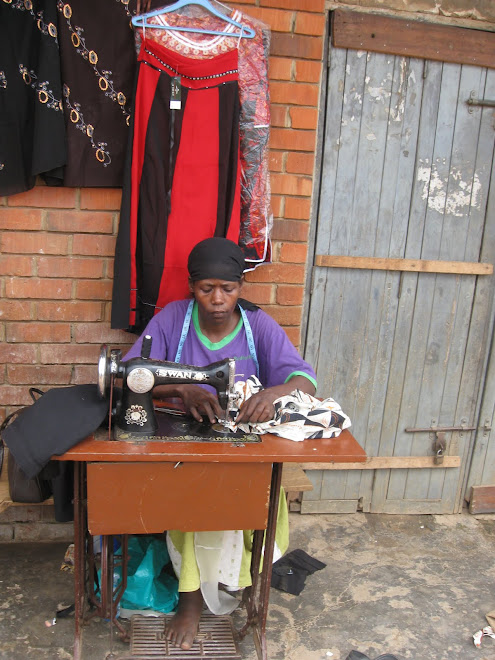The city of Kampala (and all of Uganda) is one of stark contrasts. While the government does its best to present the city as one of burgeoning business opportunities and cultural sophistication, a huge part of the population, a clear majority in fact, lives in absolute and clearly visible squalor. It is unnerving to pass a new mall with attached condos across the street from wooden hovels whose only front doors are pieces of torn fabric. These contrasts occur in many different contexts and offer a jarring sense of surrealism to the environment. Two events lately have stuck in my mind as examples of this.
I went to my first meeting of an organization for women from all over the world for "networking" purposes and to hunt up some Democrats for the new chapter of the DAU! What I found was about eighty women from everywhere (living in Uganda with their husbands who are engaged in some type of business venture here.) The most interesting part of the meeting was the speaker's presentation. He was a Canadian living in Uganda and working with an international food relief organization. He has worked in Africa since the 1973 famine in Ethiopia and presented a very clear, very frightening picture of the food shortage that will be affecting millions within a matter of months. He referred to it as '"the Big One." He began his talk by saying that the food crisis would not affect the audience but only the poorest of the poor. The four countries hardest hit will be Ethiopia, Somalia, Kenya, and Uganda. He mentioned Eritrea as well but says there are few reliable statistics available from there. Unfortunately, his talk was cut short because the secretary of the club insisted that we go over the calendar of events which included the monthly meetings of the bridge club, the garden club and the Mah Jong club. Again, that jarring juxtaposition of realities....
The other event was a "gender" class held yesterday for the youth in the Vocational Education Training program. There are about 130 young people in this program learning trades like catering, garage mechanic, beautician, etc. We divided the boys and girls into two lines and asked them each to become a "sculpture" of what they though the culture expected of them based on their gender. About six of the girls immediately dropped to their knees and bowed their heads. The rest did gestures ranging from covering their faces to striking provocative poses. Several mimicked breast-feeding. When it was the boys' turn, they all stood erect with arms crossed, or hands on hips or pointing down at the women. It was a gut-wrenching scene for this western woman so used to freedom and fairly consistent respect. Both boys and girls explained that kneeling before your husband was just a traditional sign of respect in Africa. When we asked them to switch roles and portray what their perception of the other gender was, several girls raised their fists or pulled back their hands in preparation to slap someone. The boys immediately started swishing around pretending to put on make-up or comb their hair. No portrayals of washing clothes, nursing babies, sweeping bent at the waist, or carrying heavy water cans on their heads. The Ugandan staff person leading the exercise did a very good job of wrapping up the lesson on a positive note however. She asked them to pick a partner and show what they would like their own relationships to look like. After several more disturbing displays of subserviance , several couples held hands, looked in each others' eyes, hugged, or put their arms around one another. These were greeted by loud applause and cheers. She ended the presentation by saying, "These last ones seemed to make you very happy. Is this what you want in your relationship? Next time we will talk about how to achieve it."
There is a very real struggle by the people here to respect the culture and heritage of their past while confronting the parts of that heritage which cause them pain and limit their potential for growth and well-being. It is a struggle that is familiar to Americans and to many other cultures. It is the job of those familiar with these struggles to assist and provide examples of alternatives when they are asked.
I close this entry with a birthday shout-out to my wonderful daughter, Marti!
Happy 26th!!!
I am with you in spirit..... (The date of this entry says June 5th but it's really the 7th..)
Friday, June 6, 2008
Subscribe to:
Comments (Atom)







